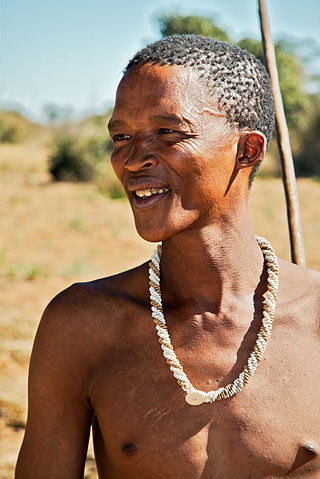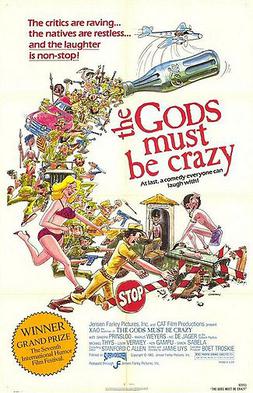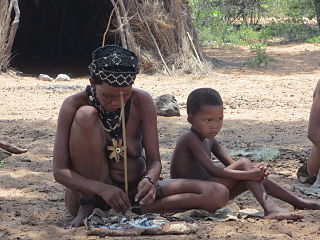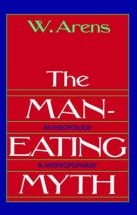
Human cannibalism is the act or practice of humans eating the flesh or internal organs of other human beings. A person who practices cannibalism is called a cannibal. The meaning of "cannibalism" has been extended into zoology to describe animals consuming parts of individuals of the same species as food.
Non-cognitivism is the meta-ethical view that ethical sentences do not express propositions and thus cannot be true or false. A noncognitivist denies the cognitivist claim that "moral judgments are capable of being objectively true, because they describe some feature of the world." If moral statements cannot be true, and if one cannot know something that is not true, noncognitivism implies that moral knowledge is impossible.

Khoisan or Khoe-Sān is a catch-all term for the indigenous peoples of Southern Africa who traditionally speak non-Bantu languages, combining the Khoekhoen and the Sān peoples. Khoisan populations traditionally speak click languages and are considered to be the historical communities throughout Southern Africa, remaining predominant until European colonisation in areas climatically unfavorable to Bantu (sorghum-based) agriculture, such as the Cape region, through to Namibia, where Khoekhoe populations of Nama and Damara people are prevalent groups, and Botswana. Considerable mingling with Bantu-speaking groups is evidenced by prevalence of click phonemes in many especially Xhosa Southern African Bantu languages.

The Gods Must Be Crazy is a 1980 comedy film written, produced, edited and directed by Jamie Uys. An international co-production of South Africa and Botswana, it is the first film in The Gods Must Be Crazy series. Set in Southern Africa, the film stars Namibian San farmer Nǃxau ǂToma as Xi, a hunter-gatherer of the Kalahari Desert whose tribe discovers a glass Coca-Cola bottle dropped from an aeroplane, and believe it to be a gift from their gods. When Xi sets out to return the bottle to the gods, his journey becomes intertwined with that of a biologist, a newly hired village school teacher, and a band of guerrilla terrorists.

The San peoples, or Bushmen, are the members of any of the indigenous hunter-gatherer cultures of southern Africa, and the oldest surviving cultures of the region. Their recent ancestral territories span Botswana, Namibia, Angola, Zambia, Zimbabwe, Lesotho, and South Africa.

The Changeling is a Jacobean tragedy written by Thomas Middleton and William Rowley. Widely regarded as being among the best tragedies of the English Renaissance, the play has accumulated a large amount of critical commentary.
Marvin Harris was an American anthropologist. He was born in Brooklyn, New York City. A prolific writer, he was highly influential in the development of cultural materialism and environmental determinism. In his work, he combined Karl Marx's emphasis on the forces of production with Thomas Malthus's insights on the impact of demographic factors on other parts of the sociocultural system.

The ǃKung are one of the San peoples who live mostly on the western edge of the Kalahari desert, Ovamboland, and Botswana. The names ǃKung (ǃXun) and Ju are variant words for 'people', preferred by different ǃKung groups. This band level society used traditional methods of hunting and gathering for subsistence up until the 1970s. Today, the great majority of ǃKung people live in the villages of Bantu pastoralists and European ranchers.

Conversations regarding the ethics of eating meat are focused on whether or not it is moral to eat non-human animals. Ultimately, this is a debate that has been ongoing for millennia, and it remains one of the most prominent topics in food ethics. Individuals who promote meat consumption do so for a number of reasons, such as health, cultural traditions, religious beliefs, and scientific arguments that support the practice. Those who support meat consumption typically argue that making a meat-free diet mandatory would be wrong because it fails to consider the individual nutritional needs of humans at various stages of life, fails to account for biological differences between the sexes, ignores the reality of human evolution, ignores various cultural considerations, or because it would limit the adaptability of the human species.
The "original affluent society" is the proposition that argues that the lives of hunter-gatherers can be seen as embedding a sufficient degree of material comfort and security to be considered affluent. The theory was first put forward in a paper presented by Marshall Sahlins at a famous symposium in 1966 entitled 'Man the Hunter'. Sahlins observes that affluence is the satisfaction of wants, "which may be 'easily satisfied' either by producing much or desiring little." Given a culture characterized by limited wants, Sahlins argued that hunter-gatherers were able to live 'affluently' through the relatively easy satisfaction of their material needs.
Jhatka is the meat from an animal killed by a single strike of a sword or axe to sever the head within the Dharmic Sikh religion, which kills the animal almost instantly as opposed to other forms of slaughter. This type of slaughter is preferred by most meat-consuming Sikhs. Also within this method of butchering the animal must not be scared or shaken before the slaughter but given a dignified, painless death.

Sustainable diets are "dietary patterns that promote all dimensions of individuals’ health and wellbeing; have low environmental pressure and impact; are accessible, affordable, safe and equitable; and are culturally acceptable". These diets are nutritious, eco-friendly, economically sustainable, and accessible to people of various socioeconomic backgrounds. Sustainable diets attempt to address nutrient deficiencies and excesses, while accounting for ecological phenomena such as climate change, loss of biodiversity and land degradation. These diets are comparable to the climatarian diet, with the added domains of economic sustainability and accessibility.

Diet in Hinduism signifies the diverse traditions found across the Indian subcontinent. Hindu scriptures promote a vegetarian dietary ideal based on the concept of ahimsa—non-violence and compassion towards all beings. According to a Pew Research Center survey, 44% of Hindus say they are vegetarian.

John Kennedy Marshall was an American anthropologist and acclaimed documentary filmmaker best known for his work in Namibia recording the lives of the Juǀʼhoansi.

"Road to the North Pole" is the seventh episode of the ninth season of the animated comedy series Family Guy. Directed by Greg Colton and co-written by Chris Sheridan and Danny Smith, the episode originally aired on Fox in the United States on December 12, 2010. In "Road to the North Pole", Stewie and Brian go on an adventure to the North Pole so that Stewie can kill Santa Claus. They discover a dreary, polluting factory full of inbred elves and carnivorous, feral reindeer, along with a sickly, exhausted and suicidal Santa. Stewie and Brian take pity on him and decide to fulfill Christmas by delivering gifts to the entire globe, albeit unsuccessfully.
June C. Nash was a social and feminist anthropologist and Distinguished Professor Emerita at the Graduate Center of the City University of New York. She conducted extensive field work throughout the United States and Latin America, most notably in Bolivia, Mexico and Guatemala. She was also a part of feminist and working class social movements such as that of the Zapatistas in Mexico.

The Man-Eating Myth: Anthropology and Anthropophagy is an influential anthropological study of socially sanctioned "cultural" cannibalism across the world, which casts a critical perspective on the existence of such practices. It was authored by the American anthropologist William Arens of Stony Brook University, New York, and first published by Oxford University Press in 1979.
The San religion is the traditional religion and mythology of the San people. It is poorly attested due to their interactions with Christianity.

Carnism is a concept used in discussions of humanity's relation to other animals, defined as a prevailing ideology in which people support the use and consumption of animal products, especially meat. Carnism is presented as a dominant belief system supported by a variety of defense mechanisms and mostly unchallenged assumptions. The term carnism was coined by social psychologist and author Melanie Joy in 2001 and popularized by her book Why We Love Dogs, Eat Pigs, and Wear Cows (2009).
The people of the Trobriand Islands are mostly subsistence horticulturalists who live in traditional settlements. Their social structure is based on matrilineal clans that control land and resources. People participate in the regional circuit of exchange of shells called kula, sailing to visit trade partners on seagoing canoes. In the late 20th century, anti-colonial and cultural autonomy movements gained followers from the Trobriand societies. When colonial rulers forbade inter-group warfare, the islanders developed a unique, aggressive form of cricket.












